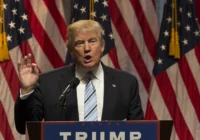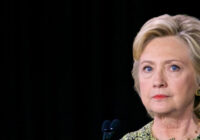Americans are hurting. They have voted for a dangerous demagogue because their political elites lost credibility by placing private benefits over public gains.
This week, Donald Trump was elected president of the United States. In perhaps fitting irony, this author is making sense of this development two miles from Mount Vernon, once home to President George Washington. How have Americans elected Trump to an office once occupied by Washington?
The simple answer would be, “It’s the economy, stupid.” Ironically, this is a phrase that James Carville came up with when plotting Bill Clinton’s victory in 1992. So, what is wrong with the economy?
The answer is a hell of a lot. The Bureau of Labor Statistics records an unemployment rate of merely 4.9%, but that hides the fact that labor force participation is merely 62.8%. Nearly 95 million Americans are not working or seeking employment.
If that’s not bad enough, jobs these days don’t pay much. As Senator Elizabeth Warren recently pointed out in a passionate speech, “wages have been stagnant for a generation while basic costs in housing, health care and childcare have skyrocketed.” The Great Recession has led to a long, steep fall in living standards. Some economists like Robert Gordon take the view that “America’s best days may be behind it.”
Not everyone is suffering, though. Ray Dalio, the financial Wizard of Oz, and Mark Zuckerberg, the emperor of Facebook, are laughing all the way to the bank. Some would say that they are the great pioneers of finance and technology who are reaping just rewards for their vision, innovation and derring-do. After all, markets do not lie. They capture a man’s true worth.
This is an argument that has long made people uncomfortable over many millennia. Inequality can be justified in many ways, ranging from income and wealth to caste and class. Yet all the intellectual sophistry in the world does not wash away that faint whiff of disgust that most conscientious people feel when confronted with it.
America was established on the premise that “all men are created equal,” but that no longer seems to be true. Cynics might point out that the author of this declaration was none other than Thomas Jefferson, who owned slaves and knocked up some pretty female ones. Nonetheless, they could do well to remember that Jefferson introduced “A Bill for the More General Diffusion of Knowledge.”
For Jefferson, liberal education enabled citizens “to guard the sacred deposit of the rights and liberties.” It was the best guard against degeneracy that oft perverts democracy into tyranny. Remember, Jefferson was writing at a time when Old Europe was still ruled by tyrants who merrily exploited their serfs and profited from the slave trade. The indebted old fornicator might not have been in favor of liberty for his slaves, but he was certainly ahead of his time in wanting to educate les sans-culottes — the common people — who did not have the means to send their children to school.
Jefferson’s point has been echoed by made since. Louis Brandeis, the first Jew to become a Supreme Court justice, echoed Jefferson when he declared, “We may have democracy, or we may have wealth concentrated in the hands of a few, but we can’t have both.”
On July 4, 2013, this author penned an piece titled, “Happy Birthday America.” It was considered by many too funereal for a festive day as it dwelt upon inequality, a fundamental problem plaguing the country. The piece quoted a 2011 report by the Congressional Budget Office (CBO) that, for the period of 1979–2007, income grew by 275% for the top 1% of households compared to a mere 18% for the bottom 20%.
As this author pointed out then, wealth inequality is worse and there is no reliable measure for it, unlike the Gini index. Still, we are starting to get glimpses into the increase in wealth concentration thanks to institutions like the US Federal Reserve (Fed). A 2014 paper by Emmanuel Saez and Gabriel Zucman concluded that “wealth inequality is making a comeback, with the top 0.1% wealth share almost as high in 2012 as in the 1916 and 1929 peaks and three times higher than in the late 1970s.”
It turns out that the bottom 90% did do better from the 1920s to the 1980s, with their share of wealth rising to 35%. But now that share has dropped to 23%, a similar level to the 1920s. Saez and Zucman conclude that “the top 1%—1.6 million families with net assets above $4 million—owns close to 42% of total wealth and the top 0.1%—160,700 families with net assets above $20 million—owns 22% of total wealth, about as much as the bottom 90%.” They also conclude that “wealth is ten times more concentrated than income today.”
This author has repeatedly said that income inequality is not ideal, but wealth inequality is a killer. One can make an argument that Cristiano Ronaldo deserves a fancy jet for his splendid physique, superlative athletic prowess and ability to kick a football. It is harder to make the same argument for an heiress like Paris Hilton.
Even as inequality has been rising, social mobility has been falling. This inter-generational mobility is lower than most economists thought. President Barack Obama has rather candidly admitted that in America, “levels of income inequality rank near countries like Jamaica and Argentina, but that it is harder today for a child born here in America to improve her station in life than it is for children in most of our wealthy allies — countries like Canada or Germany or France.”
 Fair Observer provides you deep and diverse insights for free. Remember that we still have to pay for servers, website maintenance and much more. So, donate now to keep us free, fair and independent.
Fair Observer provides you deep and diverse insights for free. Remember that we still have to pay for servers, website maintenance and much more. So, donate now to keep us free, fair and independent.
The inverse relationship between income inequality and social mobility — a phenomenon that has become known as the “Great Gatsby” curve — has come to define America. The Old Worldification of the country is moving along at a good clip, and Pablo Pardo, the chief correspondent of El Mundo, calls Uncle Sam land “a developing country without malaria” for good reason. With rising wealth and income inequality, it is fast becoming a society of tsars and serfs.
So, why are some Americans getting rich and staying rich while others are born poor and unable to break out of the poverty trap? Some of the answers are indeed obvious.
First, American tax policy has favored the rich over the poor. Margaret Thatcher and Ronald Reagan, the supporter of apartheid and liberator of markets, unleashed the “greed is good” era. Friedrich von Hayek and Milton Friedman were the new high priests of this time. At its simplest, economists believed in markets. Price signals work better than command and control. Markets are efficient. Financiers, traders and entrepreneurs drive the economy while management, bureaucrats and unions hold it back. The risk takers have to be rewarded with greater returns and taxed less. Offshore tax havens are also a good idea because they allow wealth creation, and “trickle down” is much better than redistribution.
Second, financial liberalization has benefited a narrow class. President Bill Clinton’s so-called Third Way was in thrall to financiers on Wall Street and the City of London. As this author has repeatedly highlighted, Clinton’s consiglieres — advisers — ushered in the new financial boom by throwing the Glass-Steagall Act of 1933 of President Franklin Roosevelt’s era out the window. An orgy of mergers followed. Banks became too big to fail. At the same time, they gained the right to gamble with the savings of the public. Loose lending and infernally complicated derivatives allowed bankers to hide risks, ride a bubble and reap rich rewards. Even as workers suffered, those on Wall Street prospered.
Third, globalization has decimated the working class. Clinton hailed globalization with unfettered flow of goods, services and, above all, capital as the future. It was supposed to bring in prosperity for all, but the reality turned out to be a bit more complicated. As hundreds of millions entered the global labor forces, wages for workers in developed countries fell. Since capital was mobile, companies could maximize profits by moving from Michigan to Mexico in the blink of an eye. Those who owned shares benefited while workers in rustbelts suffered. Not only did their wages fall, they often lost jobs as well.
Fourth, regulation is hurting the little man. Small businesses such as car mechanics or retailers are finding it awfully difficult to operate because of strangulating red tape. When The Economist writes about “over-regulated America,” it has a point. Here, Democrats are certainly guilty of paving the way to hell with good intentions. Most pious do-gooders in this party tend to be Harvard or Yale lawyers and career politicians with little life experience. They believe they are the smartest cookies around but most are mere cookie cutters who do not think deeply or critically. Besides, Microsoft Word has given everyone the tool of “cut and paste,” making elected representatives sloppy draftsmen who might be making Jefferson turn in his grave.
Furthermore, these legislators are highly susceptible to lobbyists because they have to raise copious sums of money for their campaigns. It is little surprise that the Dodd-Frank Act is an 848-page monstrosity, 23 times the size of Glass-Steagall.
Fifth, the economic model of winner-takes-all is concentrating power in the hands of a few. In a veritable tour de force in The Atlantic, Matt Stoller chronicled how Democrats stopped opposing monopoly power and enforcing competition. The Clinton administration shrunk the number of prime defense contractors from 107 to five. Not only did “Slick Willie” deregulate finance, he put the final nail in the idea of competition. Economies of scale were a jolly good thing even in media and telecoms. Robert Rubin, the former head honcho of Goldman Sachs, walked through the revolving doors of his office straight into the Treasury. The technocrats from Ivy Leagues were supposed to create rivers of milk and honey.
Instead, they proved only too human. They turned out to be unwise, arrogant and greedy. They justified private gain in the name of public interest. Walmart, Comcast, Monsanto and many others emerged as monopolists in their fields. Little businesses died by the hundreds. Today, big chains dominate main streets instead of small businesses. Consumers might get cheaper products from China and elsewhere at Walmart, but the retail giant hires fewer people than smaller stores and pays most of them little but minimum wage. Corporate giants have replaced open markets. It is little surprise that people feel they are at the mercy of distant forces that could not care less about their lives.
The long and short of the matter is that America is not in great shape. After the Great Recession of 2007–2009, things have been dire in many parts of the country. Many in the working class have been hurting badly: Their factories have moved to Mexico or China, their children have taken to opioids and they have been turfed out of their homes for failing to make their mortgage payments. At the same time, both Republicans and Democrats have combined to bail out banks that crashed the global financial system and caused enormous suffering to hundreds of millions. Not only did no banker go to jail, but also these masters of the universe paid themselves handsome bonuses using taxpayer money.
Obama had no stomach to fight Wall Street and continued President George W. Bush’s bailout policy. Tim Geithner, a part of the old guard, stepped into the Treasury and is now president of Warburg Pincus. Hillary Clinton and her husband went one step further. The September 18 edition of “The World This Week” chronicled how the Clintons were part of an “incestuous world of hobnobbing politicians and financiers that is riling up voters” and worried about Trump’s demagoguery winning over the angry masses. By taking millions of dollars from Goldman Sachs and others, the Clintons earned “the revenge of the forgotten class” that was hurting badly thanks to the greed of Bill and Hillary’s friends.
As if greed and hypocrisy were not enough, the arrogance of the liberal elite acting as Hillary’s cheerleaders pushed people into the Trump camp. Truth be told, the American liberal elite is highly illiberal. Like the reactionary conservatives they despise, far too many liberals view the world in binary terms. They wear their Lululemon, drink their skinny latte and listen to National Public Radio but still retain the puritanical Americano binary judgmental worldview that is incapable of factoring in complexity, plurality or nuance.
In their politically correct world, anyone opposing Hillary Clinton was sexist. The liberal establishment refused to discuss that Clinton had supported Bush in the 2003 Iraq War or her links to Wall Street. Furthermore, these narrow, technocratic and insular wise folks refused to engage seriously with issues tearing apart much of the country, like vanishing jobs, crumbling towns and declining schools. Many people wanted to rub their noses in the dirt, which is precisely what they have done. Instead of voting for someone who hobnobs with celebrities and the wealthy, they have decided to plump for the real deal in the form of the rich and famous Trump.
This election also demonstrated the corrosive effect of the decline of education on public life. Since Reagan, public schools have declined dramatically in America. In fact, schools in Democrat-run New York are highly racially segregated. Besides, as this author wrote in 2014, ballooning debt, standardized tests and the constant distraction of social media via cellphones is wrecking both the students’ desire to learn and ability to think. Students are scared to fail, busy with spreadsheets and worried to death about getting a job. The Jeffersonian ideal of education has been abandoned lock, stock and barrel. This means that voters are simply not terribly informed, educated or engaged.
Even top universities have suffered. Many professors simply do not care about their students or the life of their mind. They are incredibly narrowly trained and are fixated with success in the system as it exists. Neither they nor their students dare to question the status quo, which they take as a given. With multibillion-dollar endowments as their main goal, American universities have increasingly turned into mere watering holes on the path to McKinsey and Goldman Sachs. This means they have abdicated intellectual leadership for society and are producing no ideas for people to rally behind.
At a discussion in Harvard on American democracy, Glenn Carle, a writer and former intelligence professional, recently remarked that Thucydides and de Tocqueville matter. Homer matters. He is of the view that the teaching of humanities has been diluted to such a degree that there is no deep wrestling with the human condition. Hence, even the so-called crème de la crème of American society shy away from complexity or ambiguity and place their faith in crude ideology or charismatic individuals. This paves the way for demagogues to play Pied Piper and seduce the masses with their mix of anger, hate, fear, outrage and simplistic solutions.
Another important development has occurred. A cult of success has developed in America, with success being largely measured in money. In the age of celebrity television with good paying jobs being hard to get even as costs of healthcare, childcare, housing and education are shooting through the roof, “it is a material world” full of material girls.
The Internet and social media haven’t helped, either. In many ways, they have amplified the worst elements of American culture. Zuckerberg’s algorithms ensure that you get all the news from your friends and that you are too busy keeping up the Joneses to read something as long and boring as this piece. People have retreated into echo chambers. Everyone has their own website or self-selected group, and too many Americans are living in an alternative reality universe where facts no longer matter.
The near collapse of the media has added fuel to the fire. It turns out there are five jobs in public relations for every job in journalism. Six corporations own 90% of American media. Media leaders are torn between maximizing profits and informing the public. Given the fiduciary duty of executives to maximize returns to shareholders and good old-fashioned human greed, the fourth estate in America has abandoned informing and educating its readers or viewers. Now everyone is chasing eyeballs and clickbait is the name of the game.
It is in the interest of the media to cover celebrities and produce sensationalist stories. Therefore, the incendiary Trump makes a great story. As of March 15, this self-proclaimed billionaire had already managed to get $2 billion-worth of free media. Democracy depends on discourse, and its deplorable decline has led to a calamitous coarsening of culture.
This author repeatedly maintained that Trump’s victory was a real and tangible prospect. Even if he had lost, the celebrity billionaire would have revolutionized American politics forever. Now the revolution is gigantic. Trump has destroyed the Bushes and the Clintons as well as the establishments of the two main parties. America is now no exception to what his author has called “the global rise of the far-right.”
In the October 9 edition of “The World This Week,” this author called Trump the ultimate ugly American and a dangerous demagogue who presents an unprecedented threat to democracy in the US. That remains true today. Trump’s victory is the result of a perfect storm. Now it’s time for concerned citizens to reflect, lick their wounds, dust themselves off, think deeply, act collectively and fight the good fight for greater equity and opportunity. It is time for citizens to realize that life is more than stuff, that success cannot just be measured in dollars and that norms, decency and discourse are worth living and even dying for.
*[You can receive “The World This Week” directly in your inbox by subscribing to our mailing list. Simply visit Fair Observer and enter your email address in the space provided. Meanwhile, please find below five of our finest articles for the week.]
Photo Credit: Olya Steckel
Support Fair Observer
We rely on your support for our independence, diversity and quality.
For more than 10 years, Fair Observer has been free, fair and independent. No billionaire owns us, no advertisers control us. We are a reader-supported nonprofit. Unlike many other publications, we keep our content free for readers regardless of where they live or whether they can afford to pay. We have no paywalls and no ads.
In the post-truth era of fake news, echo chambers and filter bubbles, we publish a plurality of perspectives from around the world. Anyone can publish with us, but everyone goes through a rigorous editorial process. So, you get fact-checked, well-reasoned content instead of noise.
We publish 2,500+ voices from 90+ countries. We also conduct education and training programs
on subjects ranging from digital media and journalism to writing and critical thinking. This
doesn’t come cheap. Servers, editors, trainers and web developers cost
money.
Please consider supporting us on a regular basis as a recurring donor or a
sustaining member.
Will you support FO’s journalism?
We rely on your support for our independence, diversity and quality.











